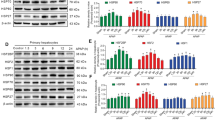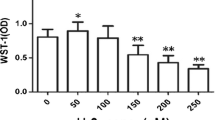Abstract
Heat shock proteins are ubiquitous intracellularproteins induced by various physiological stress-relatedevents. A 72-kDa heat shock protein (HSP72) has beenreported to be an endogenous cytoprotectant in variety of cells in vitro . In order tostudy the cytoprotective function of HSP72 in the liver,the effect of preinduction of HSP72 in rat liver bysystemic hyperthermia on thioacetamide-induced hepatic injury was investigated in this study.Expression of HSP72 in the liver was investigated byimmunoblot and densitometric analysis. Rats wereinjected with thioacetamide (100 mg/kg, subcutaneously)with or without preinduction of HSP72 byhyperthermia. Serum AST and ALT concentrations weremeasured before and after thioacetamide injection inboth group. Histologic alteration of the liver wasevaluated also. Systemic hyperthermia (42.5°C, 20min) significantly induced HSP72 in the liver.Thioacetamide-induced hepatic injury was clearlyprevented by preinduction of HSP72 by hyperthermia.Prevention of hepatocyte damage was more clear in the areaaround central veins where HSP72 induction was apparent.Our findings might suggest that HSP72 has an importantfunction in the liver with respect to cytoprotection. These results might be important forunderstanding the mechanism of “adaptivecytoprotection” in the liver mediated by thefunction of heat shock proteins as “molecularchaperons” as reported in vitro.
Similar content being viewed by others
REFERENCES
Itoh H, Tashima Y: The stress (heat shock) proteins. Int J Biochem 11:1185–1191, 1991
Compton J, McCarthy B: Induction of the Drosophila heat shock response in isolated polytene nuclei. Cell 14:191–201, 1978
Ashburner M, Bonner J: The induction of gene activity in Drosophila by heat shock. Cell 17:241–254, 1979
Levinson W, Opperman H, Jackson J: Transition series metals and sulfhydryl reagents induce the synthesis of four proteins in eukaryotic cells. Biochim Biophys Acta 60:170–180, 1980
Omar R, Lanks K: Heat shock protein synthesis and cell survival in clones of normal and SV40-transformed mouse embryo cells. Cancer Res 44:3967–3982, 1984
Sciandra JJ, Subjeck JR, Hughes CS: Induction of glucose-related proteins during anaerobic exposure and of heat shock-proteins after reoxygenation. Proc Natl Acad Sci USA 81:4843–4847, 1984
Nakamura K, Rokutan K, Narui N, Aoike A, Kawai K: Induction of heat shock proteins and their implication in protection against ethanol-induced damage in cultured guinea pig gastric mucosal cells. Gastroenterology 101:161–166, 1991
Shoeniger LO, Andreoni KA, Ott GR, Risby TH, Bulkley GB, Udelsman R, Burdick JF, Buchman TG: Induction of heat-shock gene expression in postischemic pig liver depends on superoxide generation. Gastroenterology 106:177–184, 1994
Fujio N, Hatayama T, Kinosita H, Yukioka M: Induction of mRNAs for heat shock proteins in livers of rats after ischemia and partial hepatectomy. Mol Cell Biochem 77:173–177, 1987
De-Maio A, Beck SC, Buchman TG: Induction of transitional thermotolerance in liver of thermally stressed rats. Eur J Biochem 218:413–420, 1993
Georing PL, Fisher BR, Kish CL: Stress protein synthesis induced in rat liver by cadmium preceded by hepatotoxicity. Toxicol Appl Pharmacol 122:139–148, 1993
Otaka M, Itoh H, Kuwabara T, Zeniya A, Fujimori S, Otani S, Tashima Y, Masamune O: Induction of heat shock protein and prevention of caerulein-induced pancreatitis by water-immersion stress in rats. Int J Biochem 26:805–811, 1994
Otaka M, Zeniya A, Fujimori S, Okuyama A, Jin M, Itoh S, Otani S, Tashima Y, Masamune O: Pre-induction of a 72-kDa heat shock protein prevents HCl-induced gastric mucosal lesion. Gastroenterology 110:A219, 1996
Andoh H, Itoh H, Koyama K, Sato Y, Tashima Y: Heat shock protein 70 in rat liver with necrosis and regeneration induced by thioacetamide. J Gastroenterol 29:293–298, 1994
Lowry OH, Rosebrough NJ, Farr AL, Randall RJ: Protein measurements with the Folin phenol reagent. J Biol Chem 193:265–275, 1951
Laemmli UK: Cleavage of structural proteins during the assembly of the head of bacteriophage T4. Nature 227:680–685, 1970
Towbin H, Staehelin T, Gordon J: Electrophoretic transfer of proteins from polyacrylamide gels to nitrocellulose sheets: procedure and some applications. Proc Natl Acad Sci USA 76:4350–4354, 1979
Otaka M, Itoh H, Kuwabara T, Zeniya A, Fujimori S, Tashima Y, Masamune O: Induction of a 60-kDa heat shock protein in rat pancreas by water-immersion stress. Int J Biochem 25:1769–1773, 1993
Ian WM, Paul KN: Peroxidate-lysine-paraformaldehyde fixative: A new fixative for immunoelectron microscopy. J Histochem Biochem 22:1077–1083, 1974
Hussein D, Bengt J, Inga H, Bjorn H, Uppugunduri S, Mohammed A, Bo J, Stig B: Early biochemical and histological changes in rats exposed to a single injection of thioacetamide. Pharm Toxicol 60:171–174, 1987
Hightower LE: Cultured animal cells exposed to amino acid analogues or puromycin rapidly synthesize several polypeptides. J Cell Physiol 102:407–427, 1980
Ohomori H, Murakami T, Furutani A: Simultaneous activation of heat shock protein (hsp70) and nucleolin genes during in vivo and in vitro preplicative stage of rat hepatocytes. Exp Cell Res 189:227–232, 1990
Gething MJ, Sambrook J: Protein folding in the cell. Nature 355:33–45, 1992
Balor R, Welch WJ, Voellmy R: Heat shock gene regulation by nascent polypeptides and denatured proteins. J Cell Biol 117:1151–1159, 1992
Riabowol KT, Mizzen LA, Welch WJ: Heat shock is lethal to fibroblasts microinjected with antibodies against hsp70. Science 242:433–436, 1988
Yamaguchi H, Kimura T, Nawata H: Does stress play a role in the development of severe pancreatitis in rats? Gastroenterology 88:1682–1688, 1990
Cascales M, Martin-Sanz P, Craciunescu DG, Mayo I, Aguilar A, Robles-Chillidia EM, Cascales C: Alterations in hepatic peroxidation mechanism in thioacetamide-induced tumors in rats. Effect of a rhodium(III) complex. Carcinogenesis 12:233–240, 1991
Rights and permissions
About this article
Cite this article
Fujimori, S., Otaka, M., Otani, S. et al. Induction of a 72-kDa Heat Shock Protein and Cytoprotection Against Thioacetamide-Induced Liver Injury in Rats. Dig Dis Sci 42, 1987–1994 (1997). https://doi.org/10.1023/A:1018892000606
Issue Date:
DOI: https://doi.org/10.1023/A:1018892000606




